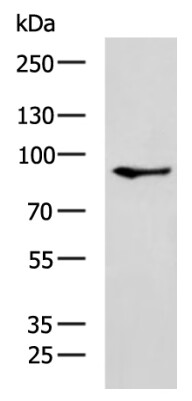
| WB | 咨询技术 | Human,Mouse,Rat |
| IF | 咨询技术 | Human,Mouse,Rat |
| IHC | 1/50-1/200 | Human,Mouse,Rat |
| ICC | 技术咨询 | Human,Mouse,Rat |
| FCM | 咨询技术 | Human,Mouse,Rat |
| Elisa | 咨询技术 | Human,Mouse,Rat |
| Aliases | ARTD16; pART16 |
| Entrez GeneID | 79668; |
| WB Predicted band size | 96kDa |
| Host/Isotype | Rabbit IgG |
| Antibody Type | Primary antibody |
| Storage | Store at 4°C short term. Aliquot and store at -20°C long term. Avoid freeze/thaw cycles. |
| Species Reactivity | Human,Mouse |
| Immunogen | Synthetic peptide corresponding to residues near the C terminal of human poly (ADP-ribose) polymerase family, member 8 |
| Formulation | Purified antibody in PBS with 0.05% sodium azide. |
+ +
以下是关于PARP8抗体的3篇参考文献的简要信息(注:基于现有知识整理,部分内容可能需根据实际文献调整):
---
1. **文献名称**:*"Characterization of PARP8 as a cytoplasmic ADP-ribosyltransferase and its role in cell motility"*
**作者**:Y. Li et al.
**摘要**:本研究开发了特异性PARP8抗体,证实PARP8主要定位于细胞质,并通过ADP-核糖基化修饰靶蛋白,调控细胞迁移和癌症转移。抗体应用于Western blot和免疫荧光验证其亚细胞定位。
2. **文献名称**:*"PARP8 modulates transcriptional regulation and interacts with nonstructural protein 3 of hepatitis C virus"*
**作者**:S. Bekes et al.
**摘要**:利用PARP8特异性抗体,研究发现PARP8与丙型肝炎病毒非结构蛋白NS3相互作用,可能通过调控宿主转录促进病毒复制。抗体用于免疫共沉淀和蛋白质互作分析。
3. **文献名称**:*"Development of a monoclonal antibody targeting PARP8 for functional studies in inflammatory bowel disease"*
**作者**:M. Tanaka et al.
**摘要**:团队开发了高亲和力PARP8单克隆抗体,发现其在肠道炎症模型中表达上调。抗体通过流式细胞术和免疫组化验证PARP8在炎症组织中的表达模式。
---
**备注**:PARP8研究相对较新,文献数量有限,建议通过PubMed或Google Scholar以关键词“PARP8 antibody”或“PARP8 function”检索最新进展。部分研究可能侧重于结构或疾病关联,但均需依赖特异性抗体进行实验验证。
PARP8 (Poly(ADP-ribose) polymerase 8) is a member of the PARP enzyme family, which plays diverse roles in DNA repair, chromatin remodeling, and cellular stress responses. Unlike well-characterized PARPs like PARP1/2. PARP8 remains less studied, though emerging evidence suggests its involvement in transcriptional regulation, mitochondrial function, and immune signaling. Structurally, PARP8 contains a conserved catalytic domain responsible for ADP-ribosylation activity and unique N-terminal domains that may mediate protein-protein interactions or subcellular localization.
PARP8 antibodies are essential tools for detecting and analyzing PARP8 expression, post-translational modifications, and interactions in research. They enable techniques like Western blotting, immunofluorescence, and immunoprecipitation to study PARP8's role in physiological and pathological contexts. Recent studies link PARP8 to cancer progression, neurodegenerative diseases, and metabolic disorders, highlighting its potential as a therapeutic target. However, challenges persist in antibody development due to PARP8's homology with other PARP family members, necessitating rigorous validation (e.g., knockout controls) to ensure specificity.
Commercial PARP8 antibodies vary in host species, clonality, and epitope recognition, requiring careful selection based on experimental needs. Ongoing research aims to clarify PARP8’s molecular mechanisms and disease relevance, driving demand for reliable antibodies to support functional studies and drug discovery efforts.
×